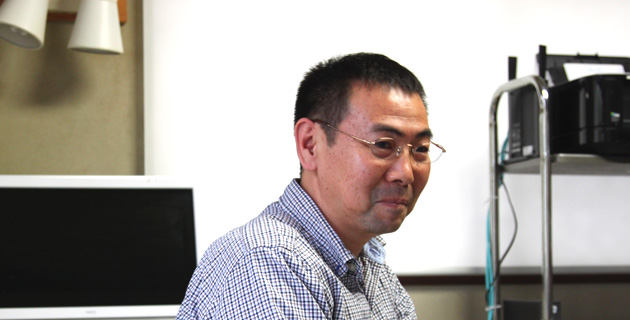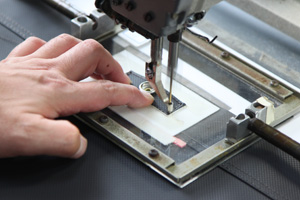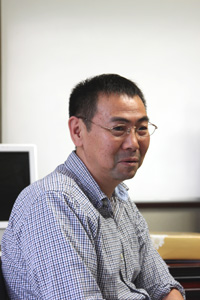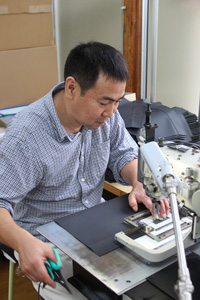
Interview : Bag maker Tsutomu Takano
Putting myself in our customer's shoes while making bags
JAPANTWO(JP2): Tell me about your thoughts on bag making.
Takano(T): Putting myself in our customer's shoes while making bags is what I think to be the most important, not only for Yoshida's bags, but for all bags made at our factory. To produce a bag that will make the person who purchased it think, "I'm glad I bought this bag," is the wish of a craftsman. On the contrary, bags that make them think, "This bag is terrible" are no good. What's more, bags made without soul do not come out looking good, and neither do those made routinely like a machine. Every single bag has a "face". I can distinguish the bags that I made among others with the same design, even from a distance. I can tell some kind of difference between bags that I made and bags that someone else made. I'm not saying which bag is good or bad, but for some reason craftsmen can recognize the faces of the bags they make.
JAPANTWO(JP2): When you are actually making them, how do you feel?

Takano(T): I feel that what I'm doing is for the craftsman that will work on the next process. That is the most important. In bag making, we usually don't make one finished product after another. For example, if we were to make a hundred, we finish the first step for all one hundred of them before moving onto the next process. So I work everything out to make the job easier for the person who will take over the next step. It's not only about finishing my part of the job, but it's also about the others who will work on it after that and finally presenting it to the customers. Everything is connected. It's the same for everything, whether it is cutting threads or sewing. No matter which part we are doing, it's essential to think about the next person.
JP2: Do you think this kind of thoughtfulness exists because it is a factory in Japan?
T: Not exactly. The reason why we can do this is because it is us. I'm not making a bag on my own, all of us make a bag together. We are not a team of craftsmen; we are, so to speak, a team of amateurs. In our case, we are working at a small factory, not a workshop, so our factory would never materialize with a team of professionals. Too many professionals would color the products with their own individual characteristics and ideas. I think that it's best not to be influenced by any style. If someone sticks to their own style, while we may be able to call them a professional, it doesn't necessarily make them well rounded. Our team is an almighty group of amateurs. So when there is something we can't do, we do it by using machines, tools, and our ideas. Even so, that doesn't mean that we are inferior to a team of craftsmen. This I'm sure about.
JP2: Then what do you think is the feature of Yoshida's products?
T: For instance, there is a unique sensitivity in the way we do things, such as the usage of color and leather, combinations of materials, and coloring of the thread; all completely different from others. Structurally it is easy to use. I think a feature of Yoshida's bags is that they are made from the customer's perspective.
JP2: Do you have any thoughts on the sewing method?
T: Durability and endurance are the outstanding characteristics. Yoshida's bags require a lot of time and effort to make. From the maker's point of view, it is difficult to sew. But it is durable due to the fact that we almost overdo it. Plus, the ones made with more effort look better even if it has the same design. I would say that this is the difference from others.
Even if it breaks, Yoshida takes care of their products till the very end.
JP2: What is the most difficult thing for you when making Yoshida's bags?

T: From the aspect of quality it can be said that there is "Heart and soul into every stitch". It is astonishingly superior in quality compared to the products of other companies. For example, the lining and reinforcement of the inside…we are required to pay a lot of attention to every detail, even if it is hidden from the outside. That is why Yoshida's bags rarely break. Even if it does, Yoshida takes care of the products until the very end. Selling the product is not the end of it. Unlike many other companies who just sell their products without caring about them and eventually mark down their prices, Yoshida's customers sense that they are cared about; therefore the bags are loved by many. There is a lot of thought put into why Yoshida rarely marks down prices.
Uematsu (YOSHIDA & CO., LTD.PR / U): We offer a repair service for our products, and sometimes receive bags which were sold five, even ten years ago.
T: Because Yoshida's bags excel in manufacturing techniques, when they come back to this factory, the bags are never damaged beyond repair. Many of the bags we receive are returned because the users were so attached to it that they wore it out. Most of the damage is from zipper tapes being torn or abrasion of the metal parts caused by many years of use. There are rarely repairs on the main compartment.
U: It is wear and deterioration caused by the natural aging process. This proves that bags can actually be used to that extent. It doesn't mean that our bags will never break, but if the same kind of problem occurs multiple times, we talk with the craftsmen to make improvements so that it will not happen again. I think we were brought up by the customers. Because Yoshida's products are recognized as durable products, we make sure that our customers will not be disappointed.
JP2: How do you feel when bags that you made a long time ago come back for repairs?
T: I feel two things. While I'm astonished that the bag was used to this extent, I am also grateful that someone used it so much that it reached such a condition.
U: We feel both amazed and grateful. Most people who use the bag for such a long time seem to have special attachments because it was a gift from someone.
T: Actually, I have a difficult time with the smell absorbing into the products, because no matter what kind of bag it is, it's almost impossible to remove the smell; like sweat or in cases of women, perfume. I pay closest attention to the smell when I am working on repairs, and also when I am making new bags. In the factory, we don't eat or smoke. We are also careful about the scent of fabric softeners on our own clothes. It doesn't help by just opening the windows while making the bags. No matter what kind of process we are in, we are extremely careful about the smell. Also, under no circumstances do we ever handle the products roughly. I hate the idea of just tossing it over to someone next to you.
T & U: We will never place them directly on the floor. If there are no spaces on the tables or shelves, we always spread paper out beneath it or put it in a box.
T: Treating the products with care is the basic principle for all craftsmen. For example, it could be a desk maker, but no matter what they are making, all craftsmen feel the same.
What comes first is making bags that would make people glad who bought it.
JP2: Do you have any thoughts on "Made in Japan"?

T: What comes to mind when hearing or seeing the words "Made in Japan" is machines or tools. The reason is because I don't have a particular skill. It doesn't mean that I am completely dependent on them, but I would like to incorporate fine machinery and tools to make fine products, even if they are foreign-made.
JP2: Is there anything specific that you believe is superior about Japanese products, or something that can only be done by Japanese craftsmen?
T: Nothing in particular. Our detailed policy or ways of manufacturing are not due to the fact that it is "Made in Japan", but rather due to our company's philosophy to make "high quality products." As a result, we achieve fine products. I am not persistent on the idea of "Made in Japan," so I think that anything made under the same kind of mindset is a fine bag, even if it is foreign-made. Nowadays, there are a lot of high quality products made in China too. I think it is necessary to admit this fact. However, I think that there is this special "something" that makes Japan-made products slightly different from foreign-made products, something which cannot be explained through words.
JP2: Is it similar to what you mentioned earlier about each bag having a "face"?
T: Yes, I believe that if we strive to make a high quality product, it will naturally be appealing. What I like about Japan-made products is the fact that there is a lot of work put into places that are not noticeable. There is no such thing as omission in the process even for the parts that are not noticeable from the outside. For me, my feelings are not for the concept of "Made in Japan." What comes first is making bags that would bring happiness to the people who bought them. To see the bags I made on the streets is the greatest happiness for me.
A Message for fans
JP2: Lastly, can you give a message to the current and future fans of Yoshida's products who are abroad?
T: Always "Heart and soul into every stitch." We make bags with care, stitch by stitch. That is the greatest thing about Yoshida & Co.,Ltd. Please give it a try and experience it for yourselves.
Website http://www.yoshidakaban.com/
